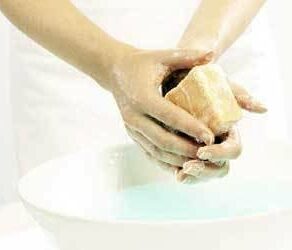Reports from around the world say that stores are selling out of hand sanitizer. While hand sanitizer can be extremely helpful, it’s important to realize that the most important way to keep your hands clean is by washing them and ensuring that you do so correctly. Here is the information you need to ensure your hands are clean and the steps that can be taken to protect them in the future. After all, one nose rub with an infected hand is all that is needed to contract dangerous viruses like coronavirus (COVID-19), the flu, or other infectious diseases.
How to Properly Wash Hands
- Begin by wetting your hands with water. The water is needed to ensure the soap lathers against the skin. Any skin-safe temperature of water is effective, however if you have a choice, warm water is best.
%22%20transform%3D%22translate(.5%20.5)%22%20fill-opacity%3D%22.5%22%3E%3Cellipse%20fill%3D%22%23a0a0a0%22%20rx%3D%221%22%20ry%3D%221%22%20transform%3D%22matrix(39.56963%2040.43018%20-19.2332%2018.82383%20114.5%2074.1)%22%2F%3E%3Cellipse%20fill%3D%22%23313131%22%20rx%3D%221%22%20ry%3D%221%22%20transform%3D%22rotate(-119.5%2020.7%2030)%20scale(149%2049.20009)%22%2F%3E%3Cellipse%20fill%3D%22%232f2f2f%22%20rx%3D%221%22%20ry%3D%221%22%20transform%3D%22matrix(5.2287%20-24.27579%20140.1976%2030.19676%20107.1%200)%22%2F%3E%3Cellipse%20fill%3D%22%236e6e6e%22%20cx%3D%22123%22%20cy%3D%22129%22%20rx%3D%2236%22%20ry%3D%2232%22%2F%3E%3C%2Fg%3E%3C%2Fsvg%3E)
- Any skin-safe soap can work to wash your hands; the main ingredient in soap that makes it effective is a “surfactant,” which is a product that reduces the surface tension on your skin that is holding a germ onto the surface, thus allowing it to be washed away more easily than with plain water alone. If no hand soap is available, body wash or shampoo can work as well. Dish liquid can also work, however laundry soap should only be used as a last resort and only if it is skin-safe (meaning that it does not contain bleach, is not concentrated such as in pods, and specifically says on the product label that it is safe for skin).
- Apply the soap to your skin and rub all areas repeatedly to lather the soap. In addition to the soap working to release the germs from the surface of the skin, rubbing the skin (abrasion) will also help to remove and even kill germs.
- Note: Although scrubbing your hands with a wash cloth or nail brush could help to kill germs (as doctors do before surgery), it is not necessary nor recommended for routine cleaning as the abrasion can easily damage the skin, causing cracks or cuts that would make you much more susceptible to contacting an illness due to the open wound.
- Sing “Happy Birthday” to yourself. This is not a joke. The length of the Happy Birthday song is approximately the ideal measurement of time for washing hands: approximately 20 seconds of lathering time. Changing the words to “Happy Washing” or “Happy Soaping” might provide even more fun or you can also get creative with who you sing for, such as singing to a pet, a celebrity, or even the moon.
- Be sure to clean under your nails as well, especially if you used a nail to tap a debit card button.
- Rinse your hands thoroughly.
- Dry your hands with a towel.
- Consider using the information from the next section on lotion.
Does Lotion Provide a Barrier of Protection Against Germs
Most lotions contain ingredients known as ceramides which provide a barrier for skin to lock in moisture and lock out various environmental influences like pollution and yes, germs as well. (However, be sure to read to the end here!) If you have a cut, a more extreme example of this protective barrier would be a salve or cream treatment to cover the cut.
Another way that lotion can provide protection is by preventing skin from drying out and becoming cracked (which would create openings for germs to enter the body more easily). –
Some lotions also contain ingredients that could help to kill some germs, such as peppermint oil or even alcohol. There are also lotions available that work in another way: they contain probiotics that add friendly bacteria onto your skin that help kill the bad germs. This provides a secondary layer of protection.
However, it is better to use a lotion that absorbs into skin for this purpose rather than one which is more greasy like a body butter as the greasiness can attract germs more easily; think of it as a sticky surface that allows dust particles to attach more easily. Using a lotion that is overly greasy can also make it more difficult for hand sanitizers or soaps to effectively remove or kill the germs when needed, so if you will be going to a public area, it would be best to apply lotion well in advance so it has enough time to fully dry. Dry healthy skin is the safest skin.
How to Properly Use Hand Sanitizer
- Hand sanitizer should be applied only as needed. Over-use of hand sanitizer can leave hands dry and cracked, allowing them your body to contract an illness more easily due to the open wound(s). Hand sanitizer also contains chemicals that will need to be processed by your body, so it’s important to never use more than a couple drops; do not ever apply hand sanitizer to your whole body at once as you could overwhelm your system with the chemicals.
- One of the most important times to apply hand sanitizer is immediately prior to eating if no washing facilities are available. Be sure that the sanitizer has fully dried before touching food.
- Hand sanitizer usually contains a strong alcohol content and therefore should never be applied to surfaces such as the steering wheel in your car or some cell phones (particularly those treated with a coating to prevent fingerprints).
Best DIY Hand Sanitizer Recipe
Here is the guide for how to properly make a DIY hand sanitizer recipe from the World Health Organization. It’s important to note that not just any hand sanitizer recipe should be used; without the proper ratio of ingredients the sanitizer could be ineffective, providing you with a false sense of security, or could also be too strong, putting your body in danger from the chemicals. Undiluted isopropyl alcohol should not be used as a hand sanitizer. Alcohol made for consumption should also not be used as a hand sanitizer without diluting as it can easily dry out hands and cause cracks.
Additional Tips for Protecting Hands from Coronavirus
- Designate your right hand for public tasks, such as touching a payment station in a store, turning on the car, or touching the car gear shift. Designate your left hand for bodily tasks only to be used if absolutely necessary, such as covering your mouth for a sneeze or rubbing your nose. When possible, use the inside of your shirt to rub your eye or nose if absolutely needed to avoid touching the surface with your hand. Keep in mind that this may not always be possible, such as if using a shopping cart rather than a basket or personal shopping bag that can be hung over your arm, so any contact with your face should be avoided until you are home and your hands have been washed.
- Do not shake hands with others.
- Try not to touch your phone, keys, sunglasses or other personal items unless your hands have recently been cleaned or you are at home. If you do have to touch these items with dirty hands, take note of what you touch and clean the area as soon as possible with the safest and most effective method for that item.
- Immediately wash hands when entering the house after being in public following the guidelines above for proper handwashing technique.
- Apply a good moisturizer before bed. Keeping skin hydrated and healthy is important. See the section above on lotion for more information on how to properly use lotion for protection.
- There are hand sanitizers and lotions available which contain probiotics to provide ongoing protection against germs like the coronavirus.
- Below is a shareable graphic to help remind yourself and others of the key tips in this guide.
%22%20transform%3D%22translate(1.8%201.8)%20scale(3.53906)%22%20fill-opacity%3D%22.5%22%3E%3Cellipse%20fill%3D%22%234b5c6c%22%20cx%3D%22136%22%20cy%3D%22210%22%20rx%3D%2236%22%20ry%3D%2227%22%2F%3E%3Cellipse%20fill%3D%22%23ffe831%22%20rx%3D%221%22%20ry%3D%221%22%20transform%3D%22rotate(101.2%2043%2051)%20scale(34.60236%20170)%22%2F%3E%3Cellipse%20fill%3D%22%23486543%22%20cx%3D%22149%22%20cy%3D%22108%22%20rx%3D%2237%22%20ry%3D%2225%22%2F%3E%3Cellipse%20fill%3D%22%236a443b%22%20rx%3D%221%22%20ry%3D%221%22%20transform%3D%22matrix(8.1793%20-27.01027%2025.36596%207.68136%2021.7%2074.8)%22%2F%3E%3C%2Fg%3E%3C%2Fsvg%3E)











Leave a reply